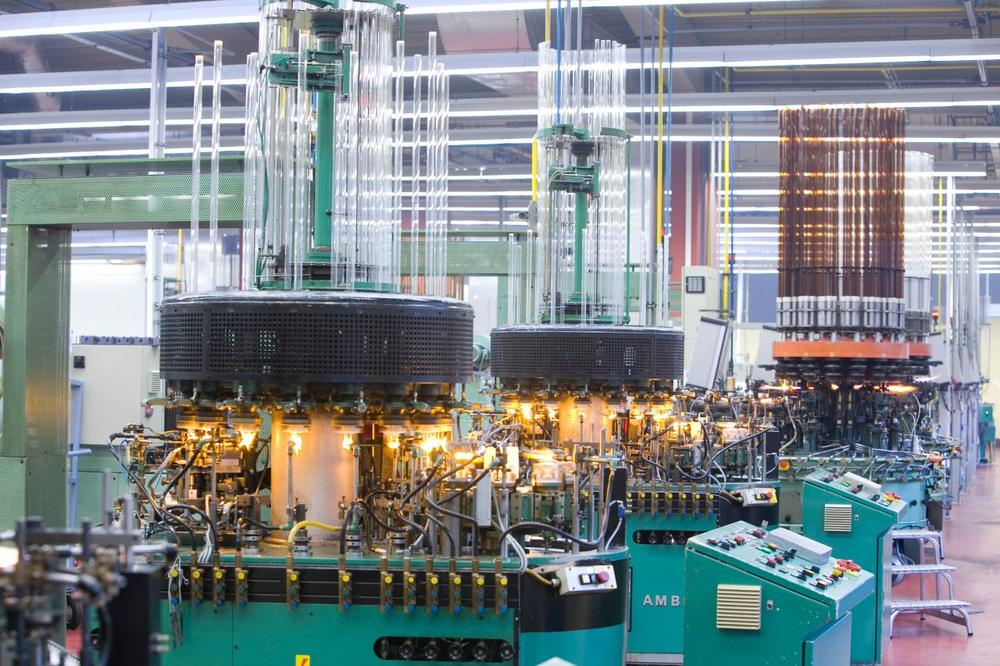However, medical-grade vaccine vials are not standard glass tubes. Whether rolled-rim bottles, threaded bottles or ampoules, they are all made of the special glass borosilicate and require customised production lines. The glass must be resistant to a wide range of chemicals and temperature changes and must not contaminate medicines, for example. Any interaction between the container and the liquid inside must be prevented, as any chemical interference could affect the vaccine. Even the smallest scratch, crack or fissure can render an entire batch unusable, contaminate the line during the filling process or even lead to a machine standstill. The demands on manufacturers are enormous: it is not only a matter of producing large quantities quickly, but also of maintaining particularly high quality standards. Industrial cameras from IDS Imaging Development Systems GmbH in Germany are currently becoming key components in demand. In an intelligent multi-camera system for the quality control of vaccine bottles from Isotronic GmbH, they take care of the image acquisition.
When increasing production capacities, efficient solutions that can be integrated quickly are in demand. The "VialChecker" developed by Isotronic meets this growing demand exactly. "Our system enables high-speed processing and is usually used at several points in the production line," explains Gregor Fabritius, Managing Director at Isotronic. The system works with up to eight cameras per unit, the camera models vary depending on the requirements of the respective control task.
For example, they observe the laterally rotating tube glass or the glass bottom and provide high-resolution images. "The IDS cameras capture at least 20 images per rotation, allowing up to 120 vials per minute to be inspected for dimensional accuracy or surface condition with very high precision," emphasises Valentin Mayer-Eichberger, Chief Operating Officer at Isotronic. Accuracy is up to 0.01 millimetres for dimensional testing. Defects such as cracks, scratches, chips, inclusions or stains, on the other hand, are detected with an accuracy of 0.1 square millimetres thanks to the powerful cameras. Intelligent software enables accurate fault description analysis and classification.
Experts estimate that global demand for vaccine vials will further increase by one to two billion over the next two years. To ensure that this valuable liquid is protected accordingly, automatic, high-performance testing systems are more in demand than ever to guarantee the immense demand for quality. "We think that we are meeting a growing demand here with our cameras and are pleased to be able to make a corresponding contribution to combating the pandemic," explains Jan Hartmann, Managing Director at IDS Imaging Development Systems.
More information: https://en.ids-imaging.com/casestudies-detail/vial-check.html
The industrial camera manufacturer IDS Imaging Development Systems GmbH develops high-performance, easy-to-use USB, GigE and 3D cameras with a wide spectrum of sensors and variants. The almost unlimited range of applications covers multiple non-industrial and industrial sectors in the field of equipment, plant and mechanical engineering. In addition to the successful CMOS cameras, the company expands its portfolio with vision app-based, intelligent cameras. The novel image processing platform IDS NXT is freely programmable and extremely versatile.
Since its foundation in 1997 as a two-man company, IDS has developed into an independent, ISO-certified family business with more than 330 employees. The headquarters in Obersulm, Germany, is both a development and production site. With branches in the USA, Japan, South Korea and UK as well as other offices, IDS is represented internationally.
IDS Imaging Development Systems GmbH
Dimbacher Str. 10
74182 Obersulm
Telefon: +49 (7134) 96196-0
http://www.ids-imaging.de
Unternehmenskommunikation
Telefon: +49 (7134) 96196155
E-Mail: s.terrasi@ids-imaging.de
Unternehmenskommunikation
Telefon: +49 (7134) 96196-155
E-Mail: s.gemmingen@ids-imaging.de
![]()

